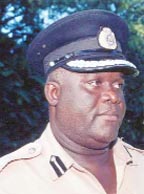-denies political meddling
The police force has denied that the Office of the Commissioner of Police is reluctant to launch a probe into the startling revelations emanating from testimony in the trial of attorney Robert Simels.
In a news release, the Guyana Police Force stated it must again draw the distinction between information and evidence, pointing out that what the force had access to regarding the trial were newspaper reports.

“The force has sought to acquire any document or documents which are public. However, statements will have to be acquired from those person or persons who have implicated others,” the force stated in its release refuting recent PNCR charges.
The main opposition party in a statement last Thursday had expressed concern that Commissioner of Police Henry Greene has seemed reluctant to launch an investigation into the developments of murder and drug trafficking in Guyana as revealed in the Simels trial. “At this point in the game,” the PNCR declared, “the nonsense that Guyana should wait until the trial is complete is merely a red herring. Roger Khan has pleaded guilty to drug trafficking in Guyana.”
The party further argued that the court documents in the United States had identified Khan as “the leader of the “phantom gang” which was responsible for the deaths of more than 200 persons, mostly Afro-Guyanese (and) this is more than sufficient evidence to trigger a probe in this country.”
According to the PNCR, “unless there is something to hide such a probe must be undertaken with dispatch or the integrity of the Commissioner of Police himself and some of his senior officers will be on the line.”
However, the police stated that “the Commissioner of Police is not reluctant to launch any probe nor has it received any instructions to the contrary.” It is expected, the police added, that with the cooperation of the US, the force “would be able to access those persons in the USA to acquire the necessary evidence so as to proceed legally in an investigation.”
Moreover, the police strongly refuted the PNCR’s claims about the introduction of political direction into the day-to-day running of the GPF and the overall policy decisions of the organization, leading to unfortunate results with rogue cops torturing citizens and being given political cover.
The force reiterated that it is “apolitical” and challenged the PNCR to “produce evidence of the day-to-day political direction and the rogue cops working under the current administration who are given political cover.” Moreover, the force assured the public that it will discharge its duty without fear or favour, malice or ill will.
It characterised the PNCR’s charges as an attack on the independence of the Office of the Commissioner of Police and the Commissioner therefore called on the party to explain what it means by “independence” and further to produce the issues which point to the political manipulation in the face of evidence and facts. In that context, the police pointed to Section 7 (1) of the Police Act, Chapter 16:01, which states: “The Commissioner shall, subject to the general orders and directions of the Minister, have the command and superintendence of the force, and he shall be responsible to the Minister for peace and good order throughout Guyana, for the efficient administration and government of the force, and for the proper expenditure of all public moneys appropriated for the service thereof.” The force said that this Act was in operation during the tenure of the PNCR in political office.
The PNCR also charged last week that while the Commissioner of Police was reluctant to launch a probe into the Roger Khan matter, he was not hampered by any such reluctance when it came to hunting down persons suspected of being involved in the burning down of the Ministry of Health. “We hesitate to say but it seems the only conclusion to be drawn is that the Commissioner of Police, contrary to the provisions of the Police Act, was proceeding as a result of political dictation,” the PNCR declared.
The party had said further that the top cop in referring to one of the suspects who had been arrested in connection with the plotting of the fire had indicated that he told at least one of the persons whom he recruited that among the reasons for him wanting to cause mayhem was that he disliked the government. “The party has noted that at a Press Conference along with the Minister of Home Affairs, Mr. Clement Rohee on 31 July 2009, the Commissioner identified as one of the dangerous elements in the society people who dislike the government. It is statements like these which make the average citizen wonder if the Commissioner of Police is as independent as he ought to be.”
But the police in refuting this said that the PNCR had gone to the extent of misrepresenting what was said by the Commissioner at the press conference held at the Ministry of Home Affairs, and queried whether the police was to understand that the arson at the Ministry of Health was not to be investigated based on the available evidence.
The PNCR had also expressed the view that the fight against crime in Guyana, in all of its forms and at all levels, “must be undertaken by a re-equipped, well-manned and independent Police Force led by an independent Commissioner of Police.”
The party alleged too that “investigations which should be unfettered by political considerations are undermined by questions of loyalty to the political directorate (and) it is time these things came to an end.”
According to the PNCR, the alternative is that the rule of law will suffer further attrition and crime will spiral out of control, with Guyana looking into the abyss of lawlessness and anarchy.



